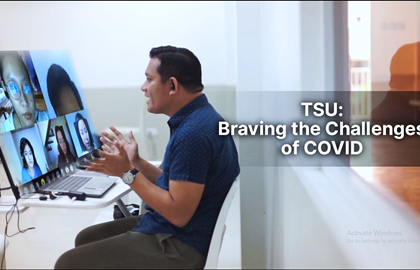Tarlac State University engaged in a cultural exchange program and international academic collaboration with The Story Christian Education and Counseling Psychology Research Institution (TSCECPR), a South Korean organization, on Thursday afternoon (August 10) at the Smith Hall Theater Room, Main Campus.
The two institutions inked a memorandum of understanding on the same day, signaling the beginning of a partnership geared toward promoting international academic cooperation inclusive of collaborative education programs, an English language proficiency program, cultural experience programs, and joint seminars, conferences, and meetings for education.
The Office of International Affairs and Linkages facilitated this pioneer international extension program with a two-day activity titled "Phil-Kor Cultural Exchange: Transcending Borders, Connecting World Cultures," which will run until August 11.
"This international extension program is the first of the many steps to make sure that, at least in the Asia-Pacific region, we all have a sense of community and our continuous goal for progress," OIAL Academic Programs Unit Head Mr. Rolien Balisi said in his welcome remarks.
He also emphasized that the program is in consonance with the United Nations Sustainable Development Goals, particularly SDGs 4, 5, 10, 16, and 17.
Dr. Jiyoung Lee, TSCECPR's chief executive officer and foreign language teacher at TSU's College of Arts and Social Sciences, was the link to the fruition of the exchange between the university and the South Korean organization.
The program's first day featured a round of interchanges centered on culture and traditions, such as songs, dances, national sports, and greetings.
"Today is a special day for everybody; today is a gift, a challenge, of course, but most importantly, an opportunity to share the culture of two nations: South Korea and the Philippines. Not only that we will be sharing our cultures and traditions, [but] this is also an opportunity for everybody to show respect [for] our cultural differences," OIAL Special Programs Unit Head Dr. Ninez Tulo said.
The Korean visitors, composed of professionals, students, and children, taught the TSU students, mainly from the League of Prospective English Educators organization, how to do the Korean traditional greeting, "where they bow to show respect to elderly people," as explained by Jeongwon Cha.
They also demonstrated the traditional Korean fan dance called "Buchaechum," the "Taekwondance," and their traditional musical instrument called "Sogo," a double-headed hand-held drum played with a beater.
Moreover, the TSCECPR delegates lent their "Hanbok," traditional Korean clothing, and Taekwondo uniforms to the TSU students so they could fully experience the Korean culture.
Meanwhile, the TSU Chorale sang their rendition of "Atin Cu Pung Singsing" from the Luzon region, "Padayon" from the Visayan region, and "Sumayaw, Sumunod," a modern song accompanied by bamboo sticks as percussion.
The TSU Performing Arts Dance Troupe also showcased the TSUian talent with their dances. The group performed "Tinikling," "Pasiguin," and "La Jota."
On the other hand, the TSU Arnis Team exhibited the Philippines' national sport.
John Yves Bolanga, LPEE student, shared the importance of transcending boundaries and exploring the richness of global heritage through a cultural exchange program when he was asked about his insights and experience.
Ji-Ae Lee of TSCECPR expressed interest in the cultural differences between the two nations.
"It was so impressive of all of you guys that performed. First, I felt something interesting because the Filipino culture is different from the Korean one. But it [became] really interesting, and it felt really good," she said.
Shortly after the program ended, the TSU students and Korean visitors had a small group discussion to learn more about each other's culture and traditions.
The second day of the cultural exchange program will be on August 11 with an arts exhibit and cooking festival.

















